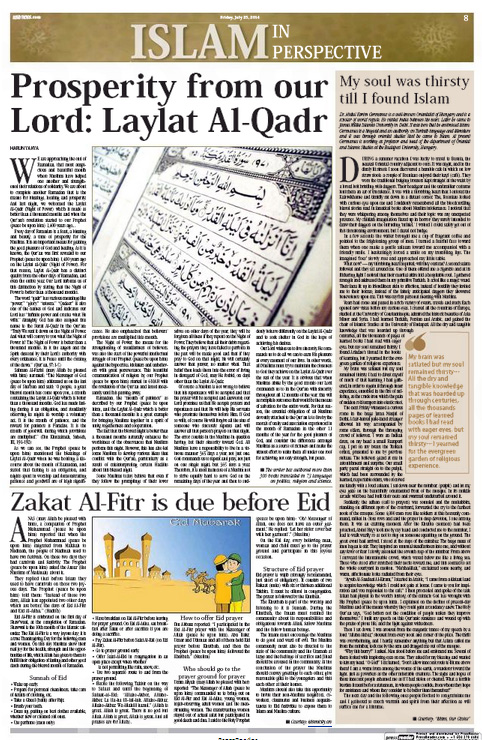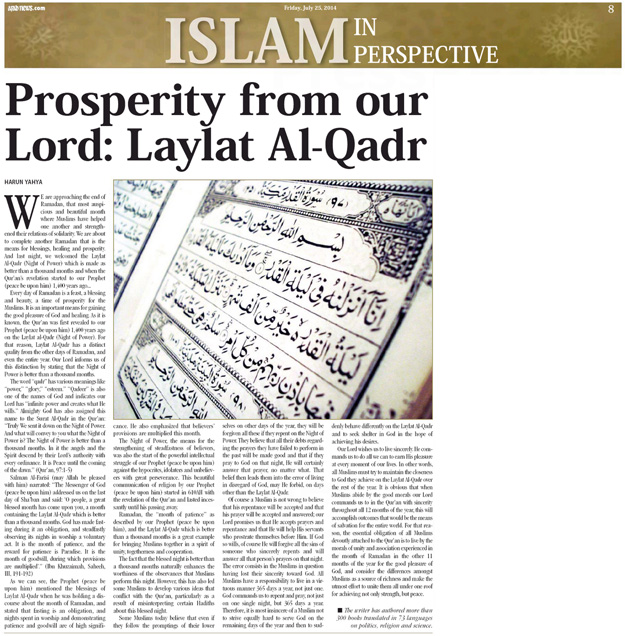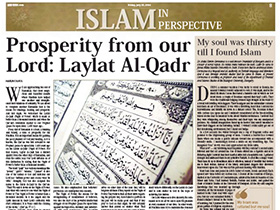
We are approaching the end of Ramadan, that most auspicious and beautiful month where Muslims have helped one another and strengthened their relations of solidarity. We are about to complete another Ramadan that is the means for blessings, healing and prosperity. And last night, we welcomed the Laylat Al-Qadr (Night of Power) which is made as better than a thousand months and when the Qur’an’s revelation started to our Prophet (peace be upon him) 1,400 years ago...
Every day of Ramadan is a feast, a blessing and beauty, a time of prosperity for the Muslims. It is an important means for gaining the good pleasure of God and healing. As it is known, the Qur’an was first revealed to our Prophet (peace be upon him) 1,400 years ago on the Laylat al-Qadr (Night of Power). For that reason, Laylat Al-Qadr has a distinct quality from the other days of Ramadan, and even the entire year. Our Lord informs us of this distinction by stating that the Night of Power is better than a thousand months.
The word “qadr” has various meanings like “power,” “glory,” “esteem.” “Qadeer” is also one of the names of God and indicates our Lord has “infinite power and creates what He wills.” Almighty God has also assigned this name to the Surat Al-Qadr in the Qur’an: “Truly We sent it down on the Night of Power. And what will convey to you what the Night of Power is? The Night of Power is better than a thousand months. In it the angels and the Spirit descend by their Lord’s authority with every ordinance. It is Peace until the coming of the dawn.” (Qur’an, 97:1-5)
Salman Al-Farisi (may Allah be pleased with him) narrated: “The Messenger of God (peace be upon him) addressed us on the last day of Sha’ban and said: ‘O people, a great blessed month has come upon you, a month containing the Laylat Al-Qadr which is better than a thousand months. God has made fasting during it an obligation, and steadfastly observing its nights in worship a voluntary act. It is the month of patience, and the reward for patience is Paradise. It is the month of goodwill, during which provisions are multiplied’.” (Ibn Khuzaimah, Saheeh, III, 191-192)
As we can see, the Prophet (peace be upon him) mentioned the blessings of Laylat Al-Qadr when he was holding a discourse about the month of Ramadan, and stated that fasting is an obligation, and nights spent in worship and demonstrating patience and goodwill are of high significance. He also emphasized that believers’ provisions are multiplied this month.
The Night of Power, the means for the strengthening of steadfastness of believers, was also the start of the powerful intellectual struggle of our Prophet (peace be upon him) against the hypocrites, idolaters and unbelievers with great perseverance. This beautiful communication of religion by our Prophet (peace be upon him) started in 610AH with the revelation of the Qur’an and lasted incessantly until his passing away.
Ramadan, the “month of patience” as described by our Prophet (peace be upon him), and the Laylat Al-Qadr which is better than a thousand months is a great example for bringing Muslims together in a spirit of unity, togetherness and cooperation.
The fact that the blessed night is better than a thousand months naturally enhances the worthiness of the observances that Muslims perform this night. However, this has also led some Muslims to develop various ideas that conflict with the Qur’an, particularly as a result of misinterpreting certain Hadiths about this blessed night.
Some Muslims today believe that even if they follow the promptings of their lower selves on other days of the year, they will be forgiven all these if they repent on the Night of Power. They believe that all their debts regarding the prayers they have failed to perform in the past will be made good and that if they pray to God on that night, He will certainly answer that prayer, no matter what. That belief then leads them into the error of living in disregard of God, may He forbid, on days other than the Laylat Al-Qadr.
Of course a Muslim is not wrong to believe that his repentance will be accepted and that his prayer will be accepted and answered; our Lord promises us that He accepts prayers and repentance and that He will help His servants who prostrate themselves before Him. If God so wills, of course He will forgive all the sins of someone who sincerely repents and will answer all that person’s prayers on that night. The error consists in the Muslims in question having lost their sincerity toward God. All Muslims have a responsibility to live in a virtuous manner 365 days a year, not just one. God commands us to repent and pray, not just on one single night, but 365 days a year. Therefore, it is most insincere of a Muslim not to strive equally hard to serve God on the remaining days of the year and then to suddenly behave differently on the Laylat Al-Qadr and to seek shelter in God in the hope of achieving his desires.
Our Lord wishes us to live sincerely. He commands us to do all we can to earn His pleasure at every moment of our lives. In other words, all Muslims must try to maintain the closeness to God they achieve on the Laylat Al-Qadr over the rest of the year. It is obvious that when Muslims abide by the good morals our Lord commands us to in the Qur’an with sincerity throughout all 12 months of the year, this will accomplish outcomes that would be the means of salvation for the entire world. For that reason, the essential obligation of all Muslims devoutly attached to the Qur’an is to live by the morals of unity and association experienced in the month of Ramadan in the other 11 months of the year for the good pleasure of God, and consider the differences amongst Muslims as a source of richness and make the utmost effort to unite them all under one roof for achieving not only strength, but peace.
Adnan Oktar's piece in Arab News



